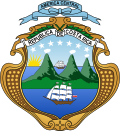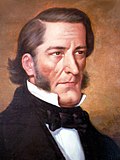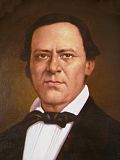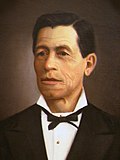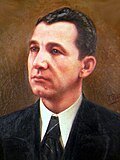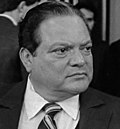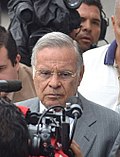トップQs
タイムライン
チャット
視点
コスタリカの大統領の一覧
ウィキメディアの一覧記事 ウィキペディアから
Remove ads
コスタリカの大統領の一覧(コスタリカのだいとうりょうのいちらん)は、コスタリカ共和国の国家元首たる大統領の一覧である。
大統領職
要約
視点
大統領はコスタリカの元首かつ政府の長であり、閣僚を任命する[1]。直接選挙で選ばれ、任期は4年だが、連続再選はできない(1969年から2005年までは再選自体が禁止されていた)。副大統領もまた大統領と同時に選ばれる。1948年に国軍が廃止されたため、他国とは違い、軍の最高司令官ではないが、公安部隊の最高司令官として憲法で表現されている[2]。
選挙
大統領選挙では修正された二回投票制が導入されており、第一ラウンドで選ばれるには少なくとも40%の得票率が必要である。第一ラウンドで選出者がいない場合は、得票数の上位2人で決選投票が行われる[3]。
資格
憲法第139条によれば、大統領あるいは副大統領になるには以下の条件を満たす必要がある。
- To be Costa Rican by birth and a citizen in exercise;
- To have secular status;
- To be older than thirty years.
性質と責務
憲法第139条によれば、大統領の排他的属性は以下の通りである[2]。
- To freely appoint and remove the ministers of government;
- To represent the Nation in the acts of official character;
- To exercise the supreme command of the public force;
- To present to the Legislative Assembly, at the initiation of the first annual period of sessions, a written message relative to the various matters of the Administration and the political state of the Republic and in which he must, additionally, propose the measures that he judges important for the good functioning of the Government and the progress and well-being of the Nation;
- To previously communicate to the Legislative Assembly, when he intends to leave the country, the motives for his trip.
第140条には、他の閣僚とともに、大統領の責務が以下の通りに記述されている[2]。
- To freely appoint and to remove the members of the public force, the employees and functionaries who serve offices of confidence, and the others that, in very qualified cases, the Law of [the] Civil Service determines;
- To appoint and to remove, subject to the requirements provided by the Law of [the] Civil Service, the rest of the [public] servants of their dependency;
- To sanction and promulgate the laws, regulate them, execute them, and see to their exact fulfillment;
- In the recesses of the Legislative Assembly, to decree the suspension of [the] rights and guarantees that paragraph 7) of Article 121 refers to[,] in the same cases and with the same limitations established there[,] and immediately give account to the Assembly. The decree of suspension of guarantees is equivalent, ipso facto, to the convocation of the Assembly to sessions, which must meet within the following forty-eight hours. If the Assembly does not confirm the measure by two-thirds of the votes of the totality of its members, the guarantees will be considered restored. If because of lack of quorum the Assembly cannot meet, it will do so the next day with any number of Deputies. In this case, the decree of the Executive Power needs to be approved by [a] vote of no less than the two-thirds part of those present;
- To exercise the initiative in the formation of the laws, and the right of veto;
- To maintain the order and the tranquility of the Nation, to take the necessary measures [providencias] for the guarding of the public liberties;
- To provide for the collection and the investment of the national incomes in accordance with the laws;
- To see to the good functioning of the administrative services and dependencies;
- To execute and to have fulfilled all that decided [on] or provided [for] in the matters of their competence [by] the tribunals of Justice and the electoral organs, at the solicitation of the same;
- To celebrate agreements, public treaties, and concordats, to promulgate them, and execute them once approved by the Legislative Assembly or by a Constituent Assembly when that approval is required by this Constitution. The protocols derived from those public treaties or international agreements that do not require legislative approval will enter into force once promulgated by the Executive Power.
- To render to the Legislative Assembly the reports that it solicits from them is the use of its attributions;
- To direct the international relations of the Republic;
- To receive the Heads of State as well as the diplomatic representatives, and to admit the Consuls of other nations;
- To convoke the Legislative Assembly to ordinary and extraordinary sessions;
- To send to the Legislative Assembly the bill of National Budget at the time and with the requirements determined in this Constitution;
- To dispose of the public force to preserve the order, defense, and security of the country;
- To issue navigation licenses;
- To give themselves the appropriate regulations for the internal regime of their offices and to issue the other regulations and ordinances necessary for the prompt execution of the laws;
- To subscribe the administrative contracts not included in paragraph 14) of Article 121 of this Constitution, under reserve of submitting them to the approval of the Legislative Assembly when they stipulate [the] exemption of taxes or rates, or [when] they have for their object the exploitation of public services, natural resources or wealth of the State.
- The legislative approval of these contracts will not give them character of laws nor will exempt them from their administrative juridical regime. That provided in this paragraph will not be applicable to the loans or other similar agreements, referred to in paragraph 15) of Article 121, which will be governed by their special norms;
- To fulfill the other duties and to exercise the other attributions that this Constitution and the laws confer to them.
制限事項
憲法において、大統領の権限には制限事項が存在し、違反すれば訴追される可能性がある[2]
第148条
The President of the Republic will be responsible for the use he makes of those attributions that according to this Constitution correspond to him in an exclusive form. Each Minister of Government will be jointly responsible with the President[,] in respect to the exercise of the attributions that this Constitution grants to both of them. The responsibility for the acts of the Council of Government will extend to all those who concurred with their vote to adopt the respective agreement.
第149条
The President of the Republic and the Minister of Government who had participated in the acts indicated as follows will also be jointly responsible:
- When they compromise in any form the freedom, the political independence, or the territorial integrity of the Republic;
- When they impede or obstruct directly or indirectly the popular elections, or infringe upon the principles of alternation in the exercise of the Presidency or of free presidential succession, or against the freedom, order, or purity of the suffrage;
- When they impede or obstruct the functions that are specific to the Legislative Assembly or restrict its freedom and independence;
- When they refuse to publish or execute the laws or other legislative acts;
- When they impede or obstruct the functions specific to the Judicial Power, or [when they] restrict the freedom with which the Tribunals must judge the causes submitted to their decision, or when they obstruct in some form the functions that correspond to the electoral organs or the municipalities;
- For all the other cases in which the Executive Power by action or omission violates some expressed law.
Remove ads
歴代コスタリカ国家元首の一覧
コスタリカ共和国国家元首 (1825-1848)
コスタリカ共和国大統領 (1848-現在)
Remove ads
脚注
関連項目
Wikiwand - on
Seamless Wikipedia browsing. On steroids.
Remove ads

